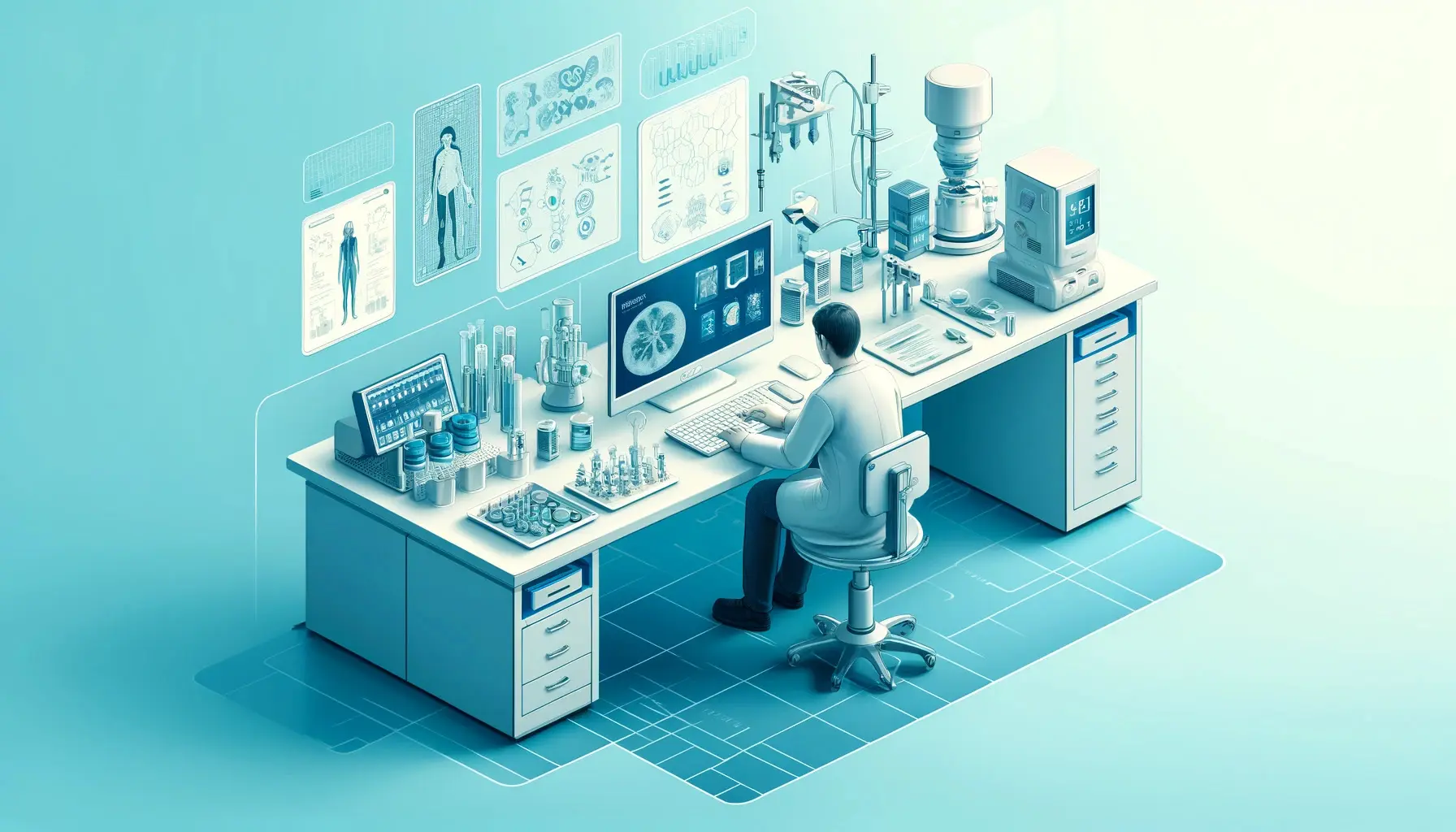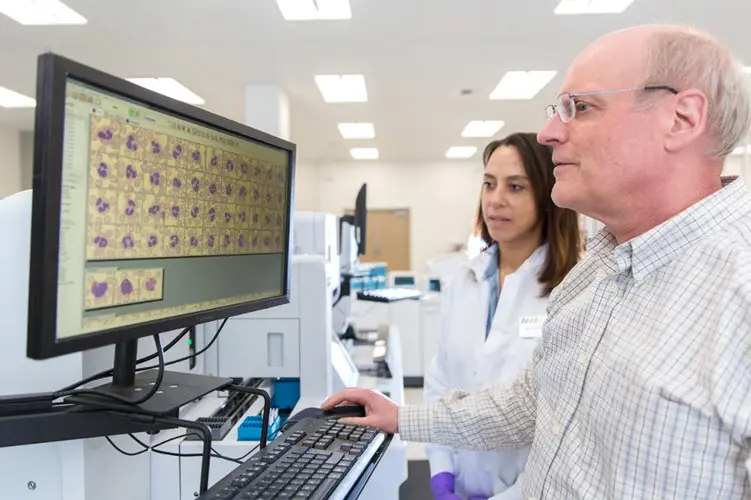Blog
How Laboratory Information Systems Help Lab Operators Overcome Industry-Wide Staffing Shortages
May 10, 2024
Clinical labs and pathology groups are processing an increased workload of patient samples causing lab managers to face the formidable challenge of enhancing their laboratory workflow management practices to meet the steep rise in sample volumes. This rising pressure to deliver is occurring alongside the current problem of widespread laboratory staffing shortages including a serious shortage of medical laboratory technicians.
Modern medical laboratories rely on a multitude of internal lab workflow processes to run smoothly, including:
- Sample tracking management
- Patient data management
- Instrument integration
- Inventory audits
- Clinical report generation
- Quality assurance
- Compliance verification
The complexity and scale of operations required to run a successful medical lab demands sophisticated technological solutions. One such solution is a pathology lab software commonly called a laboratory information system (LIS system; LIS abbreviation medical).
Learn More: The Importance of Pathology Lab Software Testimonials from Satisfied Customers
What Is an Advanced Laboratory Information System (LIS)?
The COVID-19 pandemic forced many healthcare institutions to adopt creative new approaches to resource allocation and patient care. With some medical labs having to process thousands more samples daily, this was done out of necessity. Lab directors and managers sought immediate pathology management software solutions to help them handle the massive increase in volume. For example, they turned to automation of many lab processes to improve turnaround times and minimize the potential for processing errors.
Learn More: Laboratory Information Systems (LIS vs LIMS) for Data Management
Many LIS software packages and laboratory information management system solutions from LIS vendors and LIMS providers support adding automation and digitization to the sample management process (lab sample management system). This includes the registration of samples, the tracking of them through the sample analysis/processing stage, and the generation of lab reports. However, most LIS software vendors offer legacy and off-the-shelf packages that can’t keep up with the need for advanced pathology software solutions and automation. With healthcare’s fast-evolving landscape, medical laboratories are forced to either adapt to new challenges on the fly or suffer the consequences.
Learn More: Comparing LigoLab Informatics Platform with Legacy Laboratory Information System Software
A modern and advanced LIS system facilitates high throughput for a lab, with expedited modern processes that deliver error-free test results and lab reports. For example, LigoLab offers pathology lab software that leverages the latest LIS system technology to completely automate and integrate diverse lab workflow onto a single integrated LIS system and laboratory billing (lab revenue cycle management) platform that also features a direct-to-consumer lab testing web portal. When combined this suite of applications eliminates data silos and laborious staff-intensive tasks throughout all departments, while also minimizing errors associated with the manual processing of large sample volumes.
LigoLab is geared toward addressing a medical lab’s unique needs. It partners with its customers to deliver a complete, flexible, and configurable laboratory information system software package, creating a niche in the market with its agile and bespoke medical LIS.
Learn More: Operational Excellence - It’s Possible When Using the Right Pathology Software

Mitigating the Laboratory Technician Shortage with LIS Software
A growing concern for labs is the need for more laboratory specialists and technologists even as the pool of eligible candidates is shrinking. Some labs have even witnessed a ten-fold increase in job vacancies.
Hiring pathology groups are forced to rely on a floating workforce and traveling technologists or provide cross-training to their existing staff to cover lab workflow that doesn’t require an advanced degree. Staffing shortages are impacting lab growth and revenue opportunities throughout the US with lab directors and managers now facing the challenge of using their limited staff to meet the demands of ever-increasing workloads.
As laboratory staff are tasked with increasing duties, many lab directors and managers are turning to advanced laboratory information systems to help alleviate the rising staff shortage problem and tackle it on an operational level.
Advanced laboratory information systems (LIS system software) feature automation lines tailored to a lab’s specific needs, allowing lab directors and managers to adopt rules of operation that can be applied uniformly throughout all lab workflow processes (including the laboratory billing process) and ultimately reduce dependencies on manual tasks.
Laboratory information systems (medical LIS) can help identify the pain points in a particular lab workflow and then support the configuration of automated steps that can eliminate the lags typically caused by reliance on manual interventions. Barcoding of patient samples, for example, has simplified the registration process in many labs, and it also integrates with other laboratory workflow management solutions to automate the process of sample tracking from processing to the delivery of lab reports with test results. Fewer LIS staffing personnel are thus involved in monitoring and ensuring the smooth running of the pathology specimen tracking system.
Learn More: How Specimen Tracking Software Improves Efficiency and Reduces the Chance for Diagnostic Errors
Thus, medical labs are looking toward flexible innovations within the lab information system (LIS pathology) space, which can comprehensively address the growing need for automation and reduce the pressure on the limited number of qualified LIS staffing personnel available.
The Best LIS, Key Laboratory Information System Functions
LigoLab’s LIS & RCM Laboratory Informatics Platform has comprehensive and advanced automation capability that offers visibility into every step of laboratory workflow management operations.
Real-time Dashboards
Lab directors and managers can access real-time dashboards and widgets with the LigoLab platform, allowing them to monitor lab workflow performance and immediately identify critical bottlenecks impacting a lab’s efficiency.
When a clinical lab workflow lags at any stage, a real-time dashboard and widgets can help lab directors and managers allocate more resources or configure an efficient automation process that improves throughput and minimizes reliance on LIS staffing. Improved visibility and real-time monitoring help the lab to curtail redundancy, identify pain points, and efficiently manage resources.
Interoperability
Further addressing gaps in most legacy LIS system technologies, LigoLab delivers an interoperable informatics platform that supports interfacing with multiple lab and hospital modalities. The platform can easily establish connectivity with lab billing systems for lab revenue cycle management (lab RCM), electronic health records (EHRs), and other laboratory software systems and third-party services.
LigoLab’s proprietary interface engine (lab interface system) makes this possible. The engine can electronically interface with EHRs for orders in and orders out, creating an automated LIS system solution that offsets the workload of manual order registration (electronically accessioned in lab) and lab report delivery while helping to mitigate (LIS) staffing shortages.
Barcoding and Sample Tracking
Pathology lab software workflow with LigoLab is highly configurable, and the LigoLab platform offers barcoding and sample tracking capabilities for improved patient safety throughout processing. For example, LigoLab’s laboratory information system application automatically generates just-in-time labels with unique identifiers for every sample. Lab staff can use the labels to track samples from start to finish. This automated barcoding system (lab sample management system) minimizes manual processing errors and decreases dependencies on the lab’s staff.
Quality Assurance
Most LIS systems (pathology LIS systems) integrate a quality assurance (QA) report to validate test results generated from an instrument. These are flagged to a lab technologist for review and verification. LigoLab enables an auto-verification process that scans results and validates them against an algorithm for assuring quality control, automatically approving validated results for report generation. When a set of results needs attention, the LIS system auto-verification process stacks them into a special queue and flags them for the technician to review.
This improves overall lab report quality and automates the process, eliminating redundant tasks and maximizing staff resources. Auto-verification can thus mitigate some difficulties arising from the non-availability of sufficient staff resources.
Customized Lab Reports
In addition to creating an automated environment resilient to staff shortages, LigoLab’s laboratory information system functions include unlimited lab report customizations, enabling labs to utilize the report-building template engine to differentiate themselves in an ultra-competitive market. Labs can address unique clinician/patient/doctor needs and build templates to incorporate images, inserts, diagrams, and rich text with customized color schemes.
Once the lab report has been generated, the pathology information system (pathology reporting software) can be programmed to distribute it to the tagged consulting physician or department through various channels, including electronic health records.
Learn More: How LigoLab's Pathology Lab Software Supports Lab Report Customization and Client Preferences
Compliance
LigoLab automates compliance verification at every stage, reducing audit risks and revenue loss by ensuring clinicians work within Good Lab Practices regulations (e.g., CAP, CLIA, HIPAA). This saves staff time daily and reduces the time needed to prepare for inspections and audits.
Extensive Customer Support
LigoLab is fully aware of the evolving needs of a clinical lab or pathology group and offers tailored customer support and training to enhance workflow efficiency with automation. LigoLab caters to a range of users and provides extensive training for lab directors and managers to avail themselves of handling platform configurations and customizations. Technical support is also readily available to help clinicians when the need arises.
Learn More: Navigating the Future of Pathology: The LigoLab Advantage
Laboratory Revenue Cycle Management (lab RCM)
LigoLab’s integrated LIS system & lab RCM modules on its informatics platform create unique opportunities for customers to add new revenue lines and scale their operations. The LIS and RCM modules share the same database and software infrastructure, eliminating harmful data silos and enabling claims tracking and RCM cycle integration at order inception.
The real-time monitoring and validation capacity enables error scrubbing through every stage of the laboratory billing process (RCM process) and prevents denials downstream. LigoLab’s RCM module is fully automated and compliant with regulations. It requires minimum intervention from administrators to perform administrative tasks and track claims.

A Laboratory Information System Solution to Digitally Transform and Grow
The unlimited interoperability and customization embedded within the LigoLab platform provide customers with unique opportunities to expand their lab’s business despite industry-wide staff shortages. Moreover, by incorporating highly customized automation lab workflow to deliver error-free lab reports, LigoLab’s pathology lab management solution helps medical labs retain customers (and go after new ones) as their test menus expand and their businesses grow.
Do You Still Think All LIS Systems Are the Same?
“If a medical lab thinks laboratory information systems are commodities and all the same, it’s in for a shock,” said Suren Avunjian (LigoLab CEO since jointly founding the company in 2006).
Ready to experience the power and performance an advanced LIS system can bring to your business? If yes, now is the time to contact LigoLab for a brief consultation or LIS system software demonstration with a product specialist.






